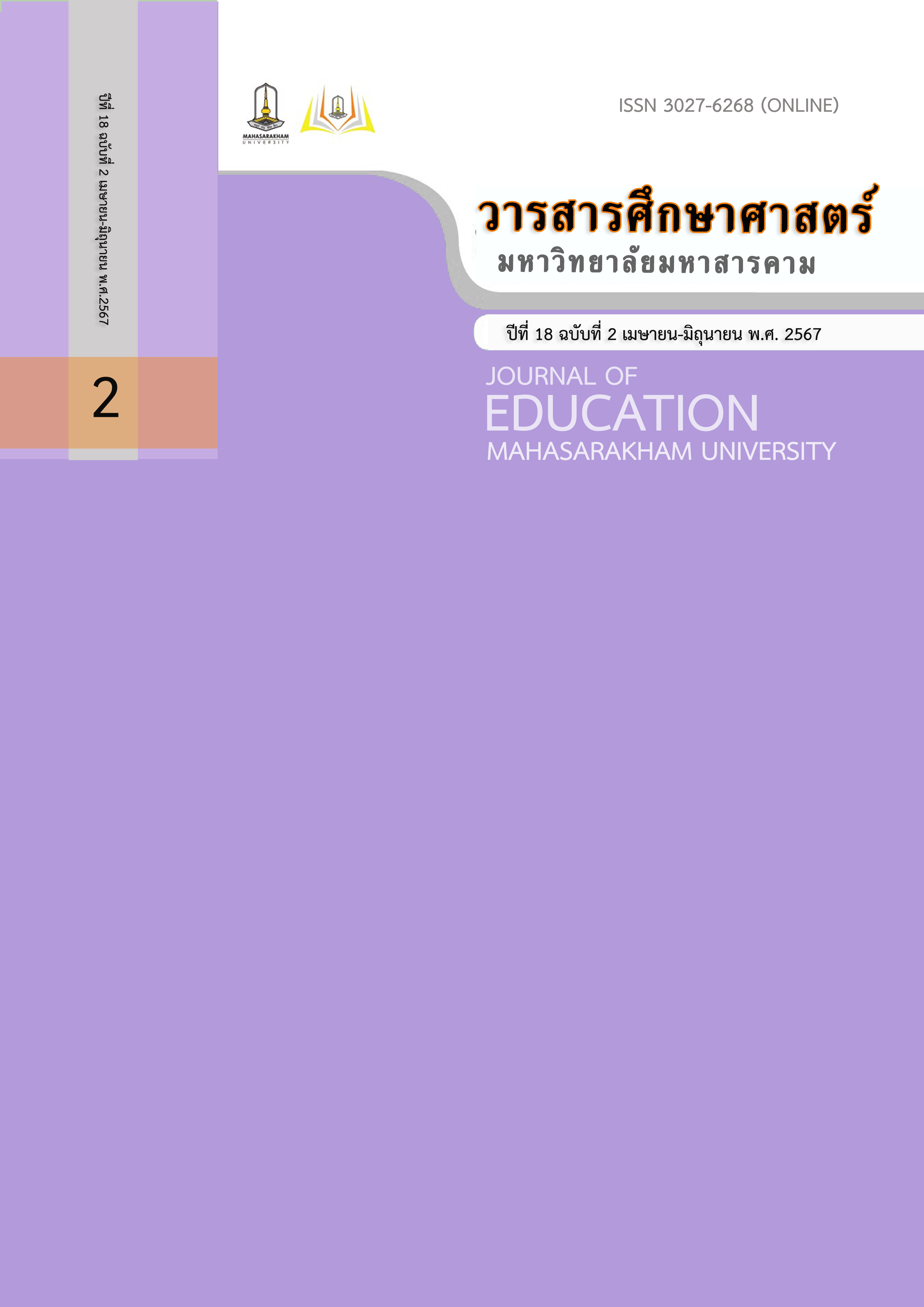Guidelines for Performance Coaching of Deputy Directors of Education Institutes under the Udon Thani Primary Educational Area Service
Main Article Content
Abstract
The purposes of this research were: 1) to study the actual states, the expected states and the needs, 2) to find the guidelines of the coaching, and 3) to evaluate the guidelines for performance coaching of deputy directors of educational institutions under the Udon Thani Primary Educational Service Area Office. The research employed the sample group of 49 educational institution directors in educational institutions with the condition of the position for no more than 2 years, obtained by a simple random sampling technique. The research instrument was a questionnaire with a 5-level Likert scale with the index of discrimination between 0.32-0.96 and the reliability of 0.98. The data was analyzed by finding frequency, percentage, mean and standard deviation. The data collection was proceeded through semi-structured interviews with 9 interviewees selected by purposive sampling technique. Content analysis was employed to explain the information – suitability, feasibility, and usefulness were assessed by 5 experts and the data was analyzed by percentage, means and standard deviation. The results were as follows: (1) the actual states overall were at moderate level, the expected states were at the highest level. For coaching skills, the actual states were at the moderate level while the expected states were at the highest level. For process skills, the actual states were at the moderate level, whereas, the expected states were at the highest level. For the need’s rank, every aspect was at the highest level with the PNImodified index between 0.695-0.843. For the process of coaching, the actual states and the expected states were at the moderate level in average. (2) The guidelines of the performance coaching for deputy directors consisted of 3 components and 16 approaches, and the coaching process consisted of 3 aspects and 14 approaches – there were 30 approaches totally. (3) The guideline’s evaluation in the aspects of suitability, feasibility, and usefulness were at the highest level overall.
Downloads
Article Details

This work is licensed under a Creative Commons Attribution-NonCommercial-NoDerivatives 4.0 International License.
References
เกรียงศักดิ์ นิรัติพัฒนะศัย และคณะ. (2555). Untold stories of executive coaching Thailand. กรุงเทพฯ: กรุงเทพธุรกิจมีเดีย.
จิตณรงค์ เอี่ยมสำอาง. (2555). การพัฒนารูปแบบการโค้ชทางปัญญาแบบเพื่อนช่วยเพื่อนเพื่อพัฒนาสมรรถภาพการโค้ชและการจัดการเรียนรู้ที่ส่งเสริมการคิดวิเคราะห์ของครูพาณิชกรรม. วิทยานิพนธ์ปริญญาปรัชญาดุษฎีบัณฑิต สาขาวิชาหลักสูตรและการสอนบัณฑิตวิทยาลัย มหาวิทยาลัยศิลปากร.
ทิพากร กิ่งมิ่งแฮ (2560). การพัฒนาแนวทางการนิเทศแบบสอนแนะ สำหรับสถานศึกษา สังกัดสำนักงานเขตพื้นที่การศึกษาประถมศึกษาอุดรธานี เขต 4 วิทยานิพนธ์การศึกษามหาบัณฑิต สาขาวิชาการบริหารและพัฒนาการศึกษา. บัณฑิตวิทยาลัย : มหาวิทยาลัยมหาสารคาม.
ทิพย์สิริ กาญจนวาสี และศิริชัย กาญจนวาสี. (2559). วิธีวิทยาการวิจัย. พิมพ์ครั้งที่ 1. กรุงเทพมหานคร: ทรีบีการพิมพ์และตรายาง.
บุญชม ศรีสะอาด. (2556). วิธีการทางสถิติสำหรับการวิจัย เล่ม 1. พิมพ์ครั้งที่ 4 กรุงเทพฯ: สุวีริยสาส์น.
ไพศาล สุวรรณน้อย. (2559). การเรียนรู้โดยใช้ปัญหาเป็นฐาน (Problem–based Learning: PBL). สืบค้นเมื่อ 2 กันยายน 2566 จาก http://ph.kku.ac.th/thai/images/file/km/pbl-he-58-1.pdf.
วัชรา เล่าเรียนดี. (2556). ศาสตร์การนิเทศการสอน และการโค้ช การพัฒนาวิชาชีพ: ทฤษฎีกลยุทธ์สู่การปฏิบัติ. (พิมพ์ครั้งที่ 12). นครปฐม: โรงพิมพ์มหาวิทยาลัยศิลปากร วิทยาเขตพระราชวังสนามจันทร์นครปฐม.
วิชัย วงษ์ใหญ่ และมารุต พัฒผล. (2557). การโค้ช เพื่อการรู้คิด (Cognitive Coaching). กรุงเทพฯ: จรัลสนิทวงศ์การพิมพ์.
ศศิมา สุขสว่าง. (2560). ทักษะการโค้ชสำหรับผู้นำ. สืบค้นเมื่อ 12 กันยายน 2566 จาก, https://www.hcdcoaching.com/17020327.
ศิริรัตน์ ศิริวรรณ. (2557). การโค้ชเพื่อผลการปฏิบัติงานที่ยอดเยี่ยม. กรุงเทพฯ: เอช อาร์ เซ็นเตอร์.
สิราวิชญ์ วัชรกาฬ. (2562). รูปแบบการพัฒนาทักษะการโค้ชสำหรับผู้บริหารสถานศึกษา สังกัด กรุงเทพมหานคร. (ฉบับที่ 2 เดือนกรกฎาคม – ธันวาคม 2562). คณะศึกษาศาสตร์ มหาวิทยาลัยศรีนครินทรวิโรฒ.
สุวิมล ว่องวานิช. (2550). การวิจัยประเมินความต้องการจำเป็น. (พิมพ์ครั้งที่ 2). กรุงเทพฯ: ธรรมดาเพลส.
อุทัย หิรัญโต. (2543). หลักการบริหารงานบุคคล. กรุงเทพฯ : โอเดียนสโตร์.
Guskey.T.R. (2000). Evaluating professional development. CA : Corwin Press.
Megginson, D & D, Clutterbuck (2010) Everyone Needs a Mentor: Fostering Talent in your organization. (London: Chartered Institute of Personnel and Development,)


